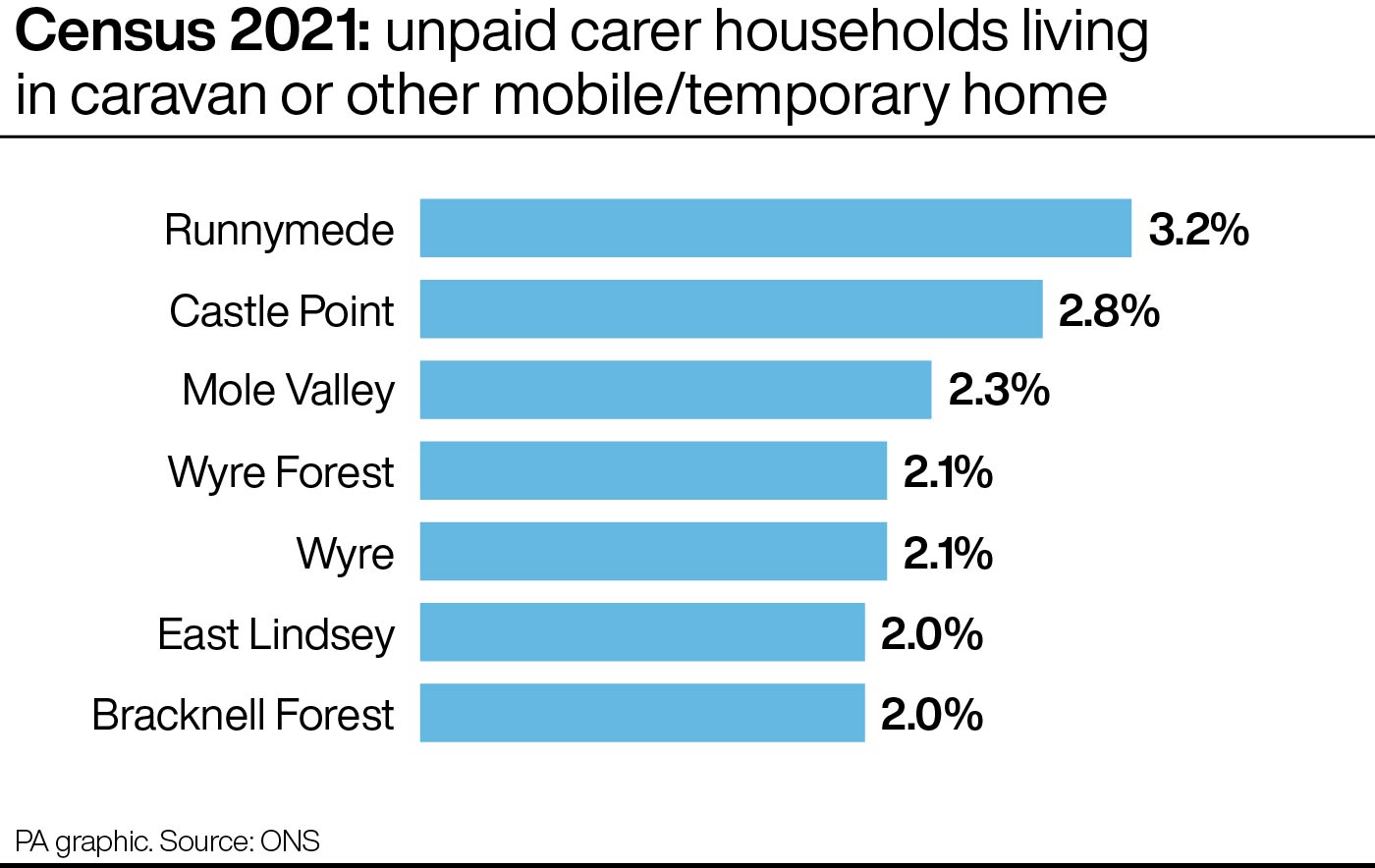At least one in five households with an unpaid carer in some of the most built-up parts of the country have no private transport and have someone who is disabled or in bad health, new analysis shows.
The areas include large cities such as Liverpool, Manchester and Newcastle, as well as some London boroughs where the figure is closer to one in three.
Nearly half a million households across England and Wales (486,341) fell into this category at the time of the 2021 census – the equivalent of 12% of all households lived in by at least one unpaid carer.
(PA Graphics)
The findings come at the start of Carers Week – an annual UK-wide awareness campaign which aims to recognise the contribution made by the UK’s 5.7 million carers.
Helen Walker, chief executive of national campaigning charity Carers UK, which set up and leads Carers Week, said the statistics demonstrate the “huge challenges” faced by many unpaid carers, and called for more to be done to raise awareness of the financial, physical and mental health impacts.
In 24 local authorities in England, at least 20% of unpaid carer households at the time of the census had no access to a car or van and had someone identified as disabled or in bad or very bad health, according to analysis by the PA news agency.
The top 12 were all in London, led by Islington (33.8% of all unpaid carer households, or 4,105), followed by Camden (32.6% or 3,852) and Westminster (32.3% or 3,491).
Outside London, areas above 20% included Liverpool at 23.6% (8,418 households), Hull at 22.0% (3,877), Manchester at 21.9% (6,735) and Newcastle at 21.8% (4,117).
There is a clear north-south split when it comes to the type of accommodation lived in by these households.
For households in terraced homes, the highest proportions are found in local authorities in northern England – while those for flats, apartments or maisonettes are mainly in the south.
Liverpool topped the list of areas with the highest proportion of unpaid carer households living in terraces without a private vehicle and with someone in bad health or disabled (11.6%), followed by Hull (11.2%), Burnley (9.7%) and Knowsley (9.2%).
By contrast, Westminster (29.6%), Camden (29.2%), Islington (28.3%) and Tower Hamlets (25.6%) headed the equivalent list for households in flats or apartments, with the entire top 15 being in London.
In Wales, Cardiff had the highest proportion of unpaid carer households in any kind of accommodation with no private transport and with someone who is disabled or in bad health (14.1%), followed by Merthyr Tydfil (13.7%), Newport (13.3%) and Blaenau Gwent (12.5%).
Merthyr Tydfil topped the list in Wales for these types of households in terraces (6.5%) while Cardiff was top for flats or apartments (3.9%).
Ms Walker said there is more Government, employers and society can do to support unpaid carers.
 (PA Graphics)
(PA Graphics)
She said: “Looking after a disabled, ill or older relative or friend unpaid can be rewarding, but it’s clear to see how many families face huge challenges; lack of transport, difficulties with housing, barriers to juggling work and care, poorer health and wellbeing and a negative impact on their finances.
“The shortage of care, lack of breaks and low carers’ benefits has left many feeling exhausted and at the end of their tether. Unpaid carers deserve better.”
She called for a “step change in the way that Government and society supports and recognises carers”, but added that employers can look at supporting employees who are juggling work and care, and society can help by ensuring family and friends are alerted to information, advice and support “which might make all the difference to someone we care about who is providing unpaid care”.
An unpaid carer is defined by the census as someone who looks after or supports anyone with a long-term physical or mental health conditions, illness or problems related to old age.
The help can be provided outside of the carer’s household, meaning some carers could be looking after someone in another household while also living with a person who is disabled or in bad health.
The PA analysis also found there were 16,784 unpaid carer households in England and Wales living in caravans or other kinds of mobile or temporary homes at the time of the census.
Runnymede in Surrey was the local authority with the highest proportion, at 3.2% of all unpaid carer households, followed by Castle Point in Essex (2.8%), Mole Valley in Surrey (2.3%) and Wyre Forest in Worcestershire (2.1%).
The PA analysis comes as Carers UK’s own polling found almost three-quarters (73%) of people in the UK who are providing, or have provided, unpaid care in their lifetime have not identified themselves as a carer. The organisation said this equates to around 19 million people.
The YouGov polling of 4,374 adults in April also suggested 31% of people in the UK with experience of providing care have seen their health and wellbeing suffer.
Carers Week is also supported by charities including Age UK, Carers Trust, Motor Neurone Disease Association, Oxfam, Rethink Mental Illness and The Lewy Body Society.
A Department of Health and Social Care spokesman said: “Unpaid carers play a vital role in our communities, and we all owe them a debt of gratitude.
“We’ve earmarked £327 million through our Better Care Fund this year to support local authorities with health and care services, including providing carers with advice, support and short breaks and respite services.
“We continue to provide financial support to unpaid carers through Carer’s Allowance, and we are finalising plans for how we deliver up to an additional £25 million to support carers and hope to share those shortly.”
https://www.eastlondonadvertiser.co.uk/news/national/23566873.unpaid-carer-households-lack-transport-cope-bad-health—analysis/




